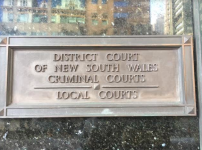Criminal Lawyers Criticise New Guilty Plea Rules

The NSW government is introducing strict rules relating to guilty pleas which it says will increase the likelihood of defendants pleading guilty to criminal offences.
The changes, which are expected to come into effect in April 2018, are aimed at reducing the backlog of cases in the District Court while freeing up police and DPP resources.
However, many in the legal profession believe they will do no such thing and could lead to injustice.
Court backlog
The District Court is currently experiencing a significant backlog of cases, with matters remitted from the local court increasing by 35 percent over the past four years.
There are currently over 2,000 criminal cases awaiting trial in the District Court and the median time between arrest and finalisation by way of trial has increased from 512 days in 2012 to 714 days at present.
President of the NSW Bar Association, Arthur Moses SC, says “It is close to breaking point, the criminal justice system in New South Wales, in particular, in the District Court,”
Impact upon the rule of law
Mr Moses points out that these delays can have serious consequences upon the mental health of both the complainants and defendants, and can impact upon the ability of courts to facilitate a fair trial.
“Delays in matters being heard may also result in evidence going stale, which may jeopardise prosecutions or result in unfair hearings,” Mr Moses says.
Increasingly harsh bail laws mean a defendant may remain in prison for years while awaiting trial, even if they are innocent of the charges. The regime is not only leading to injustice, but having adverse economic consequences for the state. A report by Auditor-General Margaret Crawford found that in 2016, the NSW prison backlog cost the state more than $200,000 a day, as correctional centres exceed their full capacity.
Ms Crawford reported that inmates awaiting trial in the District Court are costing an estimated $221,000 a day, or $60 million a year. An increasing number of those cases are more two years old.
In many cases, the defendant will ultimately have their charges withdrawn or thrown out of court, with little hope for compensation.
Current guilty plea laws
The common law currently allows for reductions of up to 25 percent for early guilty pleas, and courts have discretion when assessing the discount in any given case. Judges may look at a whole range of factors when determining the quantum of the discount applied.
The maximum (25 percent) discount – or close to it – may currently be given at a late stage in the proceedings if the nature of the allegations has changed significantly over the course of the case, and the defendant quickly entered a plea of guilty after that change.
In practice, allegations against a defendant often become far less serious over the course of the proceedings, which can result in allegations that bear little resemblance to those which were originally brought.
This can occur in several ways, including:
- The ‘facts’ (ie the prosecution’s version of the incident) can be changed significantly,
- The charges can be downgraded to far less-serious ones, and/or
- Charges can be merged (eg many charges rolled into a one charge or fewer charges).
All of the above may even occur in a single case, significantly changing its nature and seriousness, and making the allegations consistent with what actually occurred rather than a heavily exaggerated and/or inaccurate version.
Again, a defendant who then pleads guilty may currently be entitled to a significant discount, despite the prosecution only accepting to the changes late in the proceedings.
The new rules
The new rules set the following discounts for cases that go to a higher court, such as the District or Supreme Court:
- 25 percent for guilty pleas in the Local Court
- 10 percent for guilty pleas in the District or Supreme Court
- 5 percent for guilty pleas on the first day of trial or thereafter.
A sentencing judge will not be permitted to increase this fixed discount regardless of the circumstances, although he or she can reduce it.
The government hopes the new regime will encourage defendants to plead guilty in the Local Court. However, many who are actually experienced in dealing with clients and the criminal justice system have recognised the unfairness inherent in such a rigid scheme, and that it may actually dissuade defendants from pleading guilty.
Significantly, the rules completely ignore the fact that cases often change significantly throughout the course of the proceedings – that the allegations in the Local Court can bear little resemblance to those down the track in the District or Supreme Court.
For example, a defendant may initially be charged with a range of serious assault offences including ‘intentionally causing grievous bodily harm’ (maximum penalty of 25 years) and charged with ‘affray’ (10 years) based upon extremely serious police ‘facts’ (allegations).
In the District Court, the prosecution may reach the conclusion that the appropriate charge is a single count of ‘assault occasioning actual bodily harm’ (AOABH) (maximum 5 years) based upon far less serious ‘facts’ – a charge which they may see as more consistent with the evidence that is ultimately received.
If the charges and ‘facts’ are downgraded in the District Court and the defendant immediately pleads guilty thereafter, he or she will only be entitled to a maximum discount of 10 percent, despite the case being very different from the one originally brought.
Currently, submissions can be made to a District Court judge that – in such cases – the defendant pleaded guilty at an early stage after the proper allegations were brought. This can lead to a discount of 25 percent, or close to it.
But under the proposed regime, there is little incentive for a defendant to plead guilty to the ‘proper’ charges (as the maximum discount is only 10 percent), and they are more likely to take their chances at trial.
The defendant would be entitled to only 10 percent even if he or she offered to plead guilty to AOABH while the case was still in the Local Court, and that offer was refused by the prosecution at that stage (later to the be accepted in the District Court).
The expectation for defendants to plead guilty in the Local Court is made even more unfair by the fact that, under the new rules, police will no longer be required to serve the defence with a brief of evidence in the Local Court.
In essence, the government expects defendants to plead guilty in the Local Court in order to receive the maximum discount in circumstances where they are not even provided with the evidence against them.
The government’s poorly devised and ill-considered scheme is both against the interests of justice and counterproductive to its intended goal of facilitating guilty pleas.
A better way
Like many others, Bar Association president Arthur Moses SC argues that the clearing of court backlogs and the interests of justice would be better achieved through increases in legal aid funding and more District Court judges.
The CEO of the Law Society of NSW Michael Tidball agrees, stating:
“Police are bringing more alleged offenders before the courts, but victims of crime and accused persons are waiting significantly longer for cases to be resolved because judicial officers and courts do not have sufficient means to manage backlogs.”
Mr Tidball has called for the expansion of the NSW Drug Court program, noting it has been successful in lowering recidivism rates.
Despite the advice of those in the know, the NSW government seems intent on once again implementing a populist but ineffective criminal justice measure.






